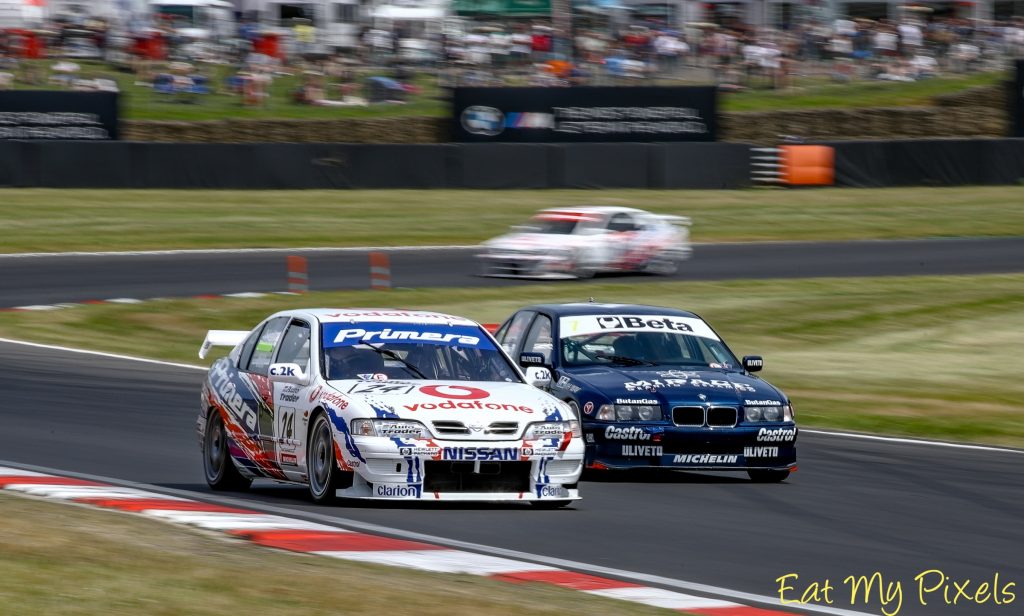After the roaring success of the inaugural Super Touring Power at Brands Hatch in 2023, the second edition went down just as well. With racing on both the Grand Prix circuit on Saturday and the spectator-friendly Indy circuit on Sunday, British Touring Car Championship star Jake Hill once again showed his liking for the BTCC’s cars of a previous era.
It wasn’t just about the racing, as a fantastic array of historical touring cars took part in high-speed demos and yet more were on static display. Big name personalities of the past were also present, including British Touring Car champions John Cleland and Laurent Aiello, world champion Rob Huff and many more besides.
Super Tourers
Headlining the event were, of course, Super Touring cars with an 18-car entry including four BTC Touring-spec machines from the immediate post-Super Touring era. Among their number were current BTCC championship leader Jake Hill, who played a starring role in the event last year, and BTCC great Steve Soper. Hill took the honours in both Grand Prix circuit races on Saturday, before Alex Morgan and AJ Owen triumphed around the Indy circuit on Sunday.
Back at the wheel of Richard Wheeler’s ex- Aiello championship winning Nissan Primera from 1999, Hill was untouchable in qualifying on the GP circuit, some 2.8 seconds clear of the field and eight tenths faster than his best time across the weekend last year.
Soper was making his CTCRC Super Tourers debut, driving the 1997 Italian championship BMW 320i that he now co-owns for the first time since 2021. He was second fastest, nearly 0.2s faster than Alex Morgan, who fired in a late improvement in his BTC-T Vauxhall Astra Sport Hatch – an earlier model from the one he took to victory at Donington Park on Good Friday.
Fourth fastest was Anthony Reid, back in his 1998 Nissan Primera (another car from the Wheeler stable), ahead of Super Tourers champion Jason Hughes (Vauxhall Vectra) and Wheeler himself (ex-David Leslie 1999 Primera). Danny Harrison (BTC-T Honda Integra) suffered from a long brake pedal on his way to seventh, while debutant Kevin Clarke (1995-spec Vauxhall Cavalier) completed the top eight.
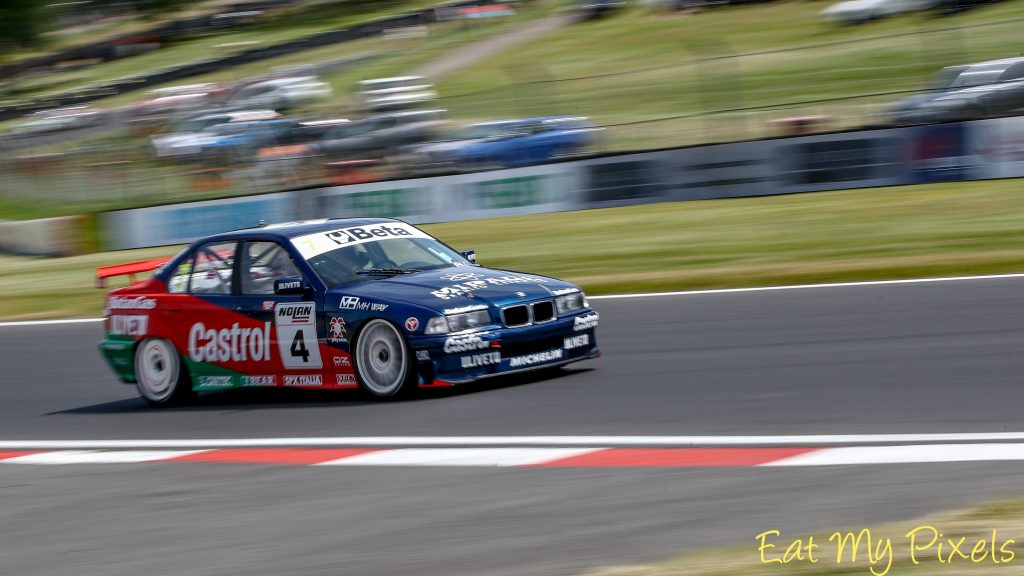
Sadly, the Allan Scott-owned Mazda 323F that Porsche Carrera Cup Deutschland racer James Kellett was due to pilot failed to turn a wheel after a suspected differential problem. Robert was also forced to withdraw after blowing his 1998 Honda Accord’s gearbox in Friday testing.
That left a 16-car field, but Colin Sowter (1998 Peugeot 406) and German visitor Steffen Irmler (1994 Opel Astra) were also unable to start the first race after suffering a cracked steering rack and a wheel-hub issue respectively.
Soper made the best getaway and pulled ahead on the outside line, but Hill held onto the lead as they entered the Druids hairpin. The pair then opened an advantage to Morgan and Reid before putting on a show for the fans, with Soper first moving ahead by diving inside the Nissan into Druids on lap four of what was set to be 10.
Soper had upped his pace from qualifying and, after Hill returned the favour at the same corner a lap later, he then retook the lead at Paddock Hill Bend on the next tour. They then traded the lead four more times before having to start looking in their mirrors as their pursuers closed in.
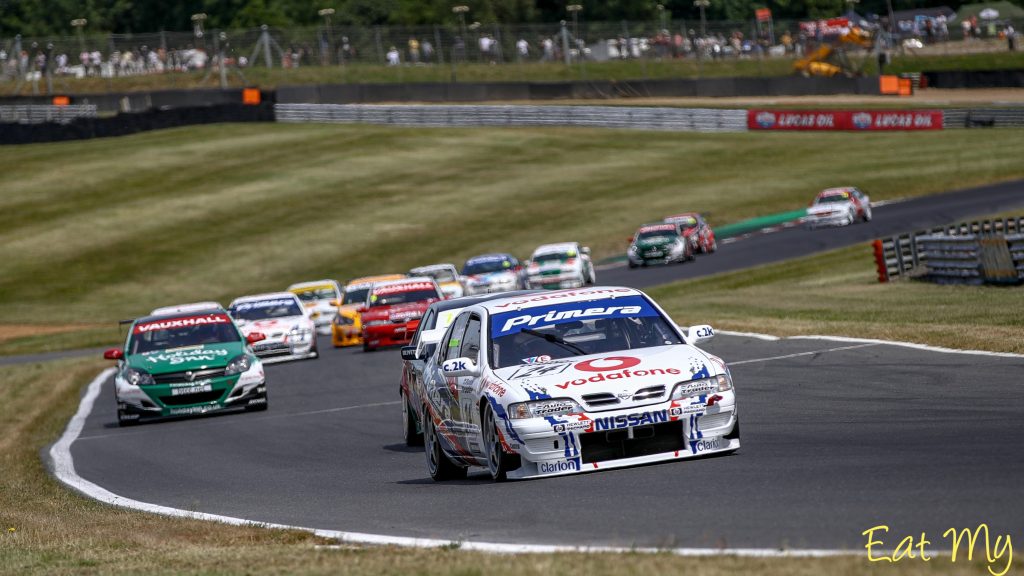
The fast-starting Hughes had initially taken fourth position but lost out to both Reid and Wheeler at Graham Hill Bend on the first lap. Hughes and Wheeler then swapped the position before Wheeler asserted himself. The 2022 Super Tourers champion also passed Reid for fourth as his confidence increased on the GP circuit, having raced on it only once previously.
Meanwhile, Morgan was beginning to struggle with oil leaking onto his own tyres. He was caught and passed by Wheeler, Reid and Hughes, with Wheeler then closing up to the leaders.
Onto the last lap, Wheeler sniffed an opportunity to pass Soper. He tried the outside line at Druids but, as the pair exited the corner, contact was made. Soper’s BMW was pitched violently into the tyre barriers before bouncing back and swiping Wheeler’s machine. Both were out on the spot, their weekends done, with extensive – and expensive – damage to the cars. Reid took to the grass to avoid the incident before pulling up at the next corner, his engine blown.
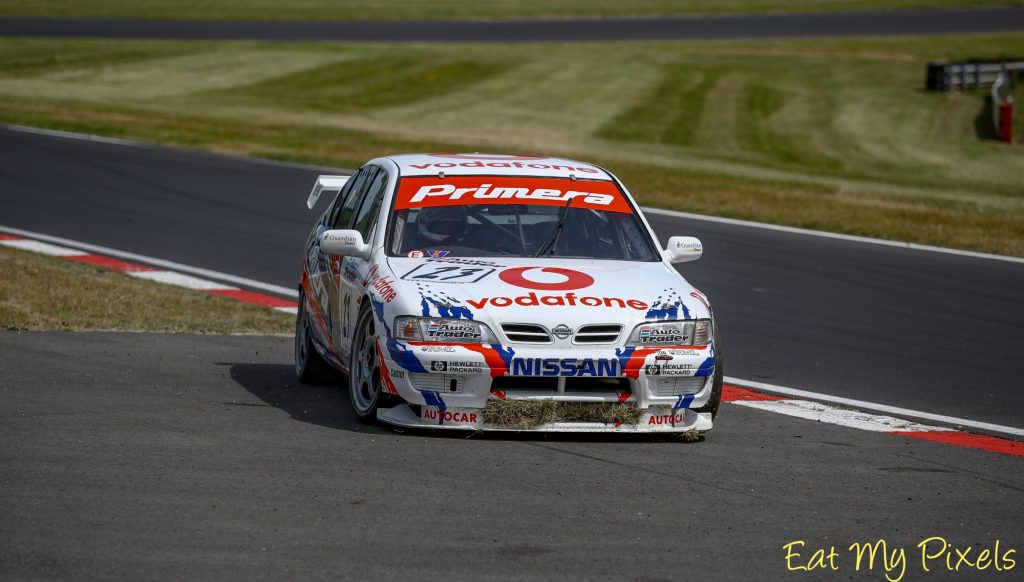
Unsurprisingly, red flags came out and the result was called, with Hill taking victory from Hughes and Morgan. Harrison was fourth, hampered by a broken gear shifter, while Owen’s Duratec-powered 1993 Ford Mondeo completed the top six.
“I’m racing with Steve Soper and he’s in a BMW!” exclaimed Hill with typically boyish enthusiasm. But he spoke for everyone when he added: “I’m just so gutted it ended that way.”
The loss of race one’s four retirees – including Clarke (driveshaft) – was partially compensated by Irmler and Sowter being able to take their places on the grid for race two. Sowter was thankful for period Peugeot driver Patrick Watts living locally to the circuit and fetching a steering rack from his own 406 to lend him.
When the race got going, the front four of Hill, Hughes, Morgan and Harrison pulled a gap to the rest of the field. Harrison took third on lap three of 10 as Morgan hit trouble on the hastily prepared Astra once again. A brake-fluid leak left him with very little stopping power and caused a scary moment at Hawthorns, the very fast right-hander at the end of the GP circuit’s longest straight.
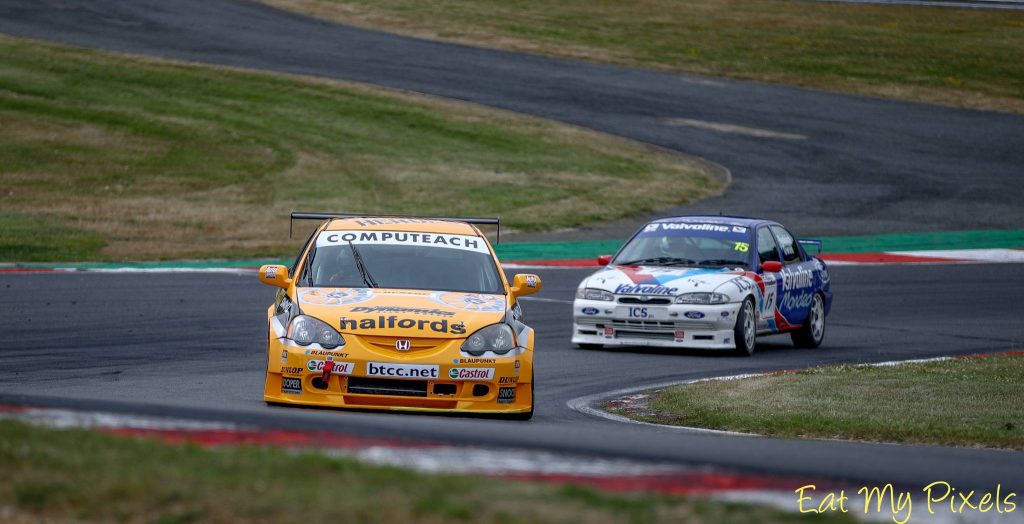
Ahead of the two BTC-T cars, Hughes was able to snatch the lead from Hill on a couple of occasions. But cheered on by Aiello, who was watching from the commentary tower, the self-confessed “Nissan fanboy” got back in front and put the hammer down in the closing stages to take victory by 6s.
Hughes was a comfortable second after Harrison, third, was slowed by gear-selection issues. Morgan was forced to significantly ease his pace; he was passed by Owen and the third BTC-T car of Adam Woods (2002 Honda Civic) but brought the Astra home in sixth overall to bank more points towards his title challenge.
Sunday’s racing switched to the 1.2-mile Indy circuit, set entirely within the Kent venue’s natural amphitheatre. Sadly, an expensive Saturday for Wheeler’s stable meant that the surviving cars of Hill and Harrison were also withdrawn, leaving 10 cars to contest Sunday’s action.
Another was lost in qualifying as Tony Absolom’s 1995 Vauxhall Cavalier blew a hole in its engine block. The omens were still good for some more close racing action though, as Hughes and Morgan battled to secure pole position. The pair ended the session just 0.078s apart as the Vectra edged the Astra.
Sowter was third fastest, ahead of Roger Stanford. The CTCRC veteran, and two-time champion, was making a very welcome return to racing after his frightening Pre-’66 crash at Oulton Park two years ago. And he was doing it in a third Vauxhall Astra Sport Hatch – his first time in a front-wheel-drive racer.
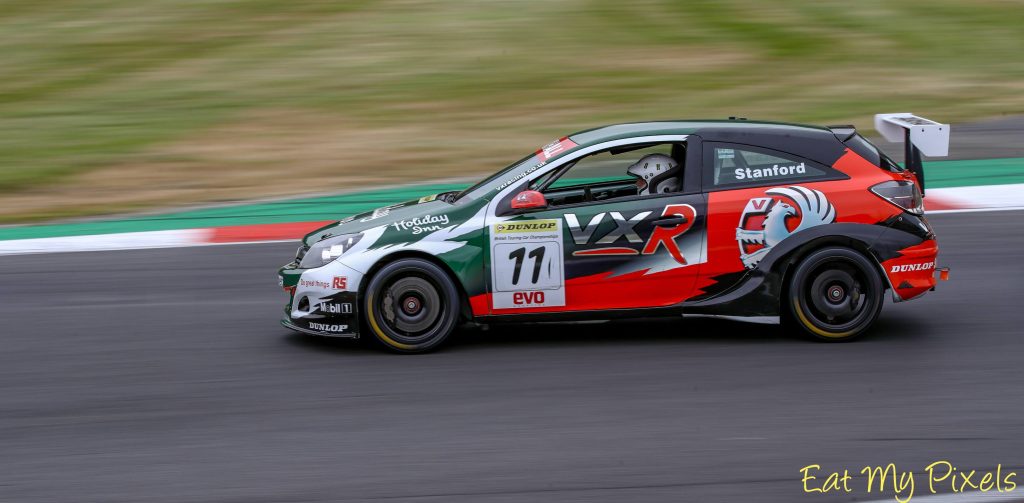
Absolom had set the fifth fastest time before his Cavalier expired, ahead of Owen, whose session was also shortened by a puncture.
In the race, Hughes led from Morgan, Sowter and Owen. Morgan initially looked set to heap the pressure on the former BTCC man but soon began to drop with a loss of power-steering. Hughes had built an advantage of more than 5s by mid-race but suddenly slowed and pitted on lap 10 of 16. A heavy vibration preceded a bang and a loss of steering ability, suspension failure the suspected cause.
So Morgan took over in front, with a healthy advantage over Sowter’s Peugeot, which he held to the flag despite his travails, taking victory by 7s – his second of the Super Tourers season.
“It was not the easiest of races,” admitted Morgan. “It has tired me out somewhat more than I thought it was going to, so delighted to actually get home with a win.”
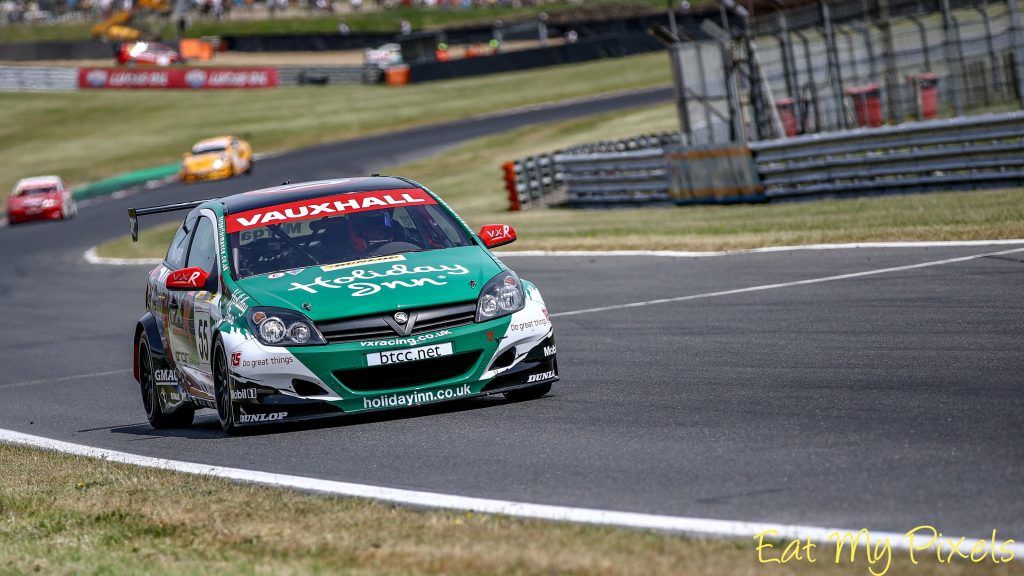
Owen had retired just before Hughes with a similar looking problem – in his case, a broken rose joint in the front-right suspension. That meant an entertaining scrap between the oldest car in the field – Jim Pocklington’s 1990 Vauxhall Cavalier – Irmler, Stanford and Woods would decide the final podium place.
Irmler and Stanford both found their way past the Cav and third looked set to go the way of the German. But Stanford wasn’t giving up, and squeezed past at Surtees on the final lap to claim the position. A Pocklington pitstop allowed Woods to take fifth, but the Vauxhall did return to the circuit and limped home in sixth position.
By the final race – and sixth on-track session for the cars over the weekend – the intense schedule had taken its toll, with only seven cars able to take the start. Morgan set the pace and led Sowter by 6s going on to lap eight. Then, with little warning, a trackrod failed and spat the Sport Hatch through the gravel and into the wall at the foot of Paddock Hill.
Sowter inherited the lead, with the resulting safety-car period bunching the pack up, with Stanford second and Owen third. Irmler had powered past Stanford early on but was then forced to pull off.
Owen timed his restart to perfection, passing Stanford just after the control line. He then chased down Sowter and dived inside at McLaren, only to run wide on the exit. Sowter cut back inside and nosed back ahead but, in a drag race to the line, it was the Mondeo that snatched victory by just 0.126s. Behind them, Pocklington also managed to beat Stanford and grab the final podium position at the death.
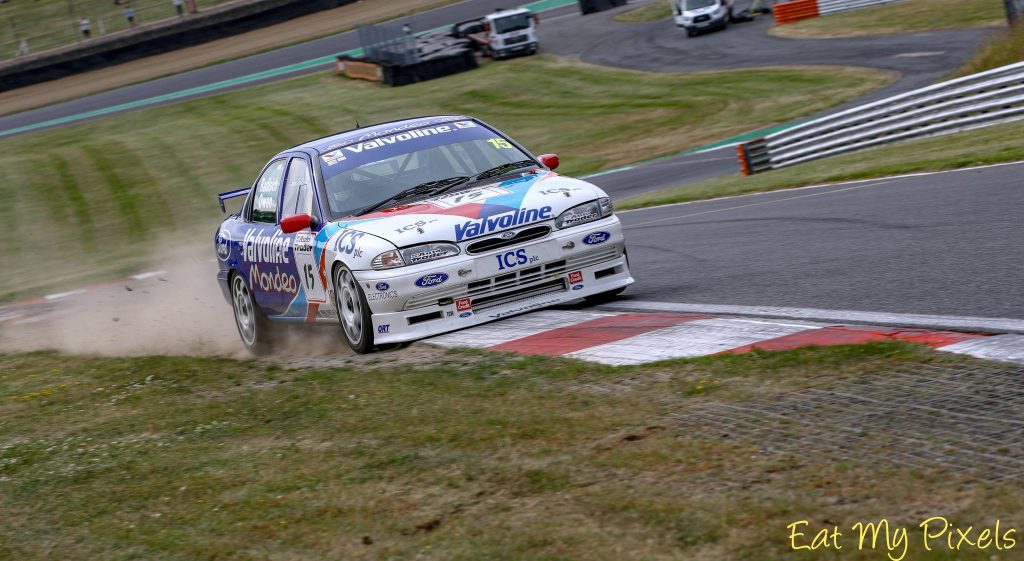
“This has been years of hard work,” said the emotional victor. “I’ve won races before, I’ve won championships before, but you’re racing against really good people here – Roger Stanford, Jim Pocklington, they’ve raced in bigger stuff than I ever will.
“I saw the safety car and I thought, ‘Just red flag it, that’s done, I’m happy with where I am.’ And then I thought to myself, ‘You’ve got a chance here.’ I put myself down but in a car I believe in myself.
“I thought to myself, ‘You’ve got half a chance this last lap.’ And I went into Druids and I went, ‘Just win it or bin it.’ And I thought to myself, ‘Dad’s going to kill me if I bin this!’ And I got Colin on the inside and the car just understeered all the way outside, and I just buried my foot as hard as I can, just pulled a gear, and we were neck-and-neck, drag race to the line.
“It’s years and years of hard work, and I’m just nut behind the wheel. Really, the credit goes to my dad [Craig] because he is phenomenal.”
It was a fittingly emotionally charged finish to another fantastic event which, despite the unfortunate first-race incident and attrition, was a credit to all involved.
Check back on the CTCRC website in the coming days for a full rundown of all the cars involved.
Group A with Laser Tools Pre-’93 Touring Cars
An additional aspect to this year’s event brought together a grid of Group A touring cars from the 1980s era immediately preceding Super Touring cars, which raced alongside the CTCRC’s regular Pre-’93 championship.
A fine entry of flame-spitting Ford Sierra RS500s took part, while BMW was represented by Toby Partridge’s new-build M3 E30, which he was set to share with Steve Soper, and the magnificent original 635CSi of Simon Glenn and Jody Halse. Local legend Rod Birley also wheeled out the Group N E30 of pal Frank Cundell for its first race in three decades.
Experienced RS500 duo Paul Mensley and Dan Brown set the pace throughout the weekend and split the wins evenly. However, both were beaten in a truncated Grand Prix circuit qualifying session by David Tomlin’s similar car. Brown was second fastest, ahead of CTCRC regular Mike Manning and Motorbase Performance founder Dave Bartrum. Having been trying to find a gap in the traffic, Mensley only managed fifth fastest and would start alongside Jeremy Sutton’s B&H-liveried car, with Partridge best of the BMWs in seventh.
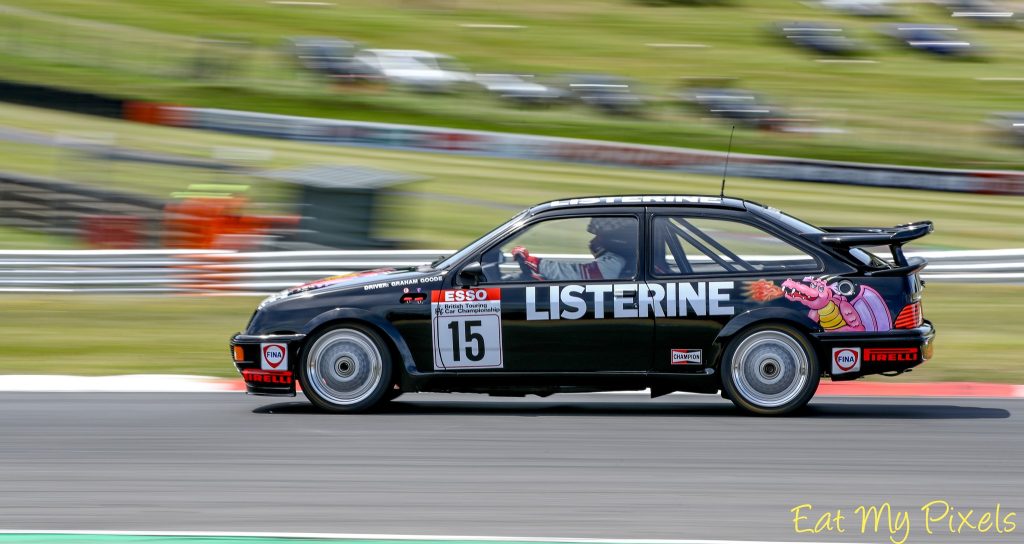
Among the Pre-’93 championship runners, Stuart Waite’s BMW M3 E36 was fastest by more than 2s from Will Davison’s similar car, with Ian Bower and Kevin Willis next up.
Sadly, after Soper’s Super Tourers accident, Partridge didn’t make the start, and Bower was also sidelined by wishbone failure. Joey Binks’s Karl Jones-tribute RS500 then pulled up on the green-flag lap with a broken throttle cable. Bartrum’s Dick Johnson-tribute car was another early casualty when it toured in, a split boost hose sapping its power.
When the race got going, Brown charged around the outside to lead, then began building an advantage as Mensley worked his way forward. Mensley set the fastest lap as he chased Brown down, then took the lead on the seventh lap after Brown caught a backmarker as they charged through the fast sweepers of the GP circuit.
But with Trevor Kyffin’s Alfa Romeo 75 in the gravel at Surtees, the race was red-flagged, putting Brown back in front on countback. Behind them, Tomlin and Manning enjoyed a good tussle for third, in which Tomlin prevailed. A little further back, Sutton was fifth in Group A and Halse sixth.
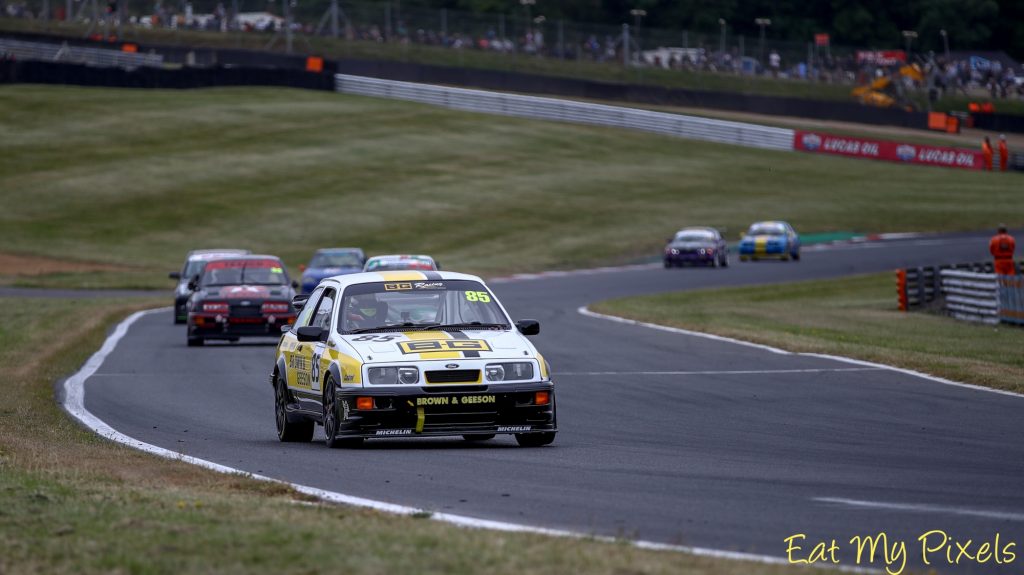
In Pre-’93, Waite found himself bottled up behind Manning’s RS500, unable to pass because of its superior power. But he had the buffer of other cars between himself and the chasing Davison and Willis, who completed the podium.
Waite also found himself getting among the RS500s in the early stages of race two, before their slick tyres were up to temperature. As the race settled down he was put under severe pressure by Davison, but held firm to win, with Willis once again third. Bower, meanwhile, charged from the back of the grid to finish fourth in Pre-’93.
Waite had enjoyed the chance to race on the GP circuit. “We don’t get to race on it often, so got to make the most of it,” he said.
At the head of the field, Brown and Mensley recommenced their duel. Mensley put the Essex racer under pressure for the opening laps before briefly easing back. He closed back in and made his move on half-distance. After initially trying to fight back, Brown dropped away but closed in again as Mensley throttled back with oil on track in the closing stages. When he spotted his pursuer in the mirror, Mensley upped his pace again to take the win.
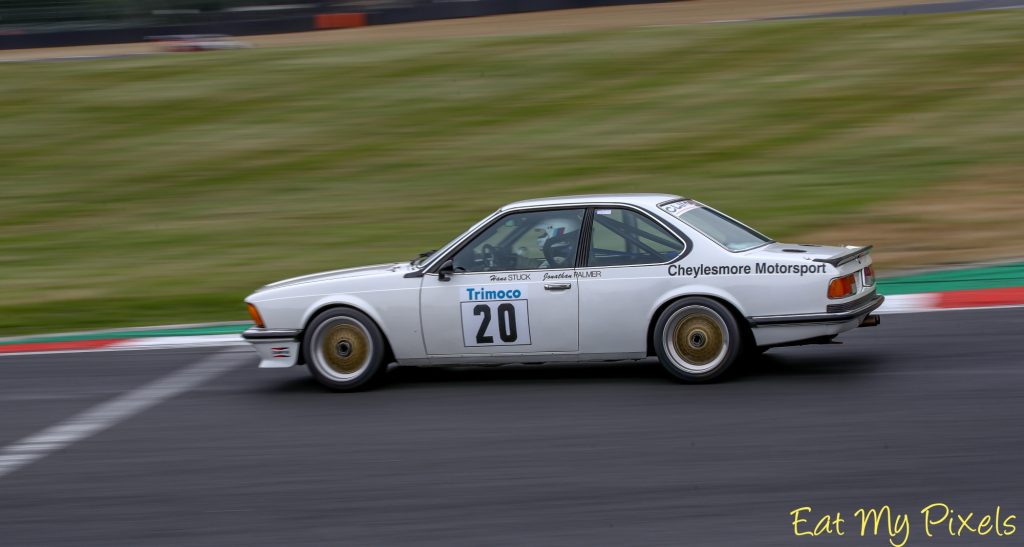
Manning ran third early on, while Bartrum pitted on the fourth lap with his car overheating – or so it was telling him. A poorly-calibrated sensor was unnecessarily limiting power. Meantime, Manning lost out to Tomlin for third in Group A.
Sunday’s action moved to the shorter Indy circuit, where it was Brown who beat Mensley to pole position by the tiny margin of just 0.026s. Bartrum, Tomlin and Manning completed the top five, ahead of Glenn and Clark. Pre-’93 qualifying took place in a separate session topped by the guesting Oliver Owen, who joined the fray for the day alongside his Classic Thunder racing. Waite was two tenths down, ahead of Terry Davies, Willis, Davison and Shaun Morris.
Brown converted pole into the race lead but this time it took Mensley only until lap three of 16 to find a way past at Druids. The gap concertinaed and the pair traded the lead in the second half of the race before Mensley raced to a 1.4s victory. “I love racing with Dan,” he said, feeling much better after suffering from heat stroke in the previous day’s searing temperatures. “He’s fair, he’s clean, he keeps me honest.”
Bartrum overhauled Manning on the final lap to take third on the road, only for a 5s track-limits penalty to reverse the positions. A lap down, Glenn finished fifth in Group A, while Clark’s debut in the Renault came to a steaming halt with suspected head-gasket failure.
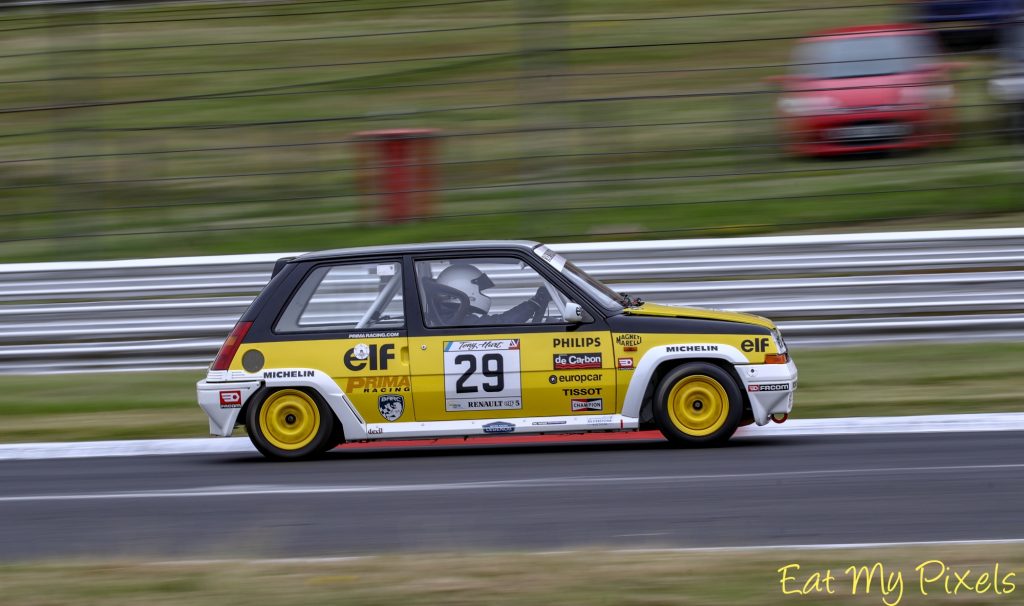
In the fourth and final outing of the weekend, Brown got a better getaway from the rolling start, but Mensley held the inside line into Paddock Hill Bend. But Brown carried more pace and both he and Bartrum got in front at Druids.
Mensley reclaimed second from the former BTCC team boss at Surtees, then chased down the leader. The Leicester racer took over on one-quarter distance and pumped in a series of quick laps, only to suffer a spin on his worn tyres and lose around 10s. That handed the lead to Brown, which he duly converted to victory. Mensley had enough in hand to recover to second, just 2s down on the winner.
“There’s nothing like an RS500,” beamed Brown, surely speaking for all the participants. “Paul’s had the legs, I’m not going to lie, but it’s racing – you never know what’s going to happen.”
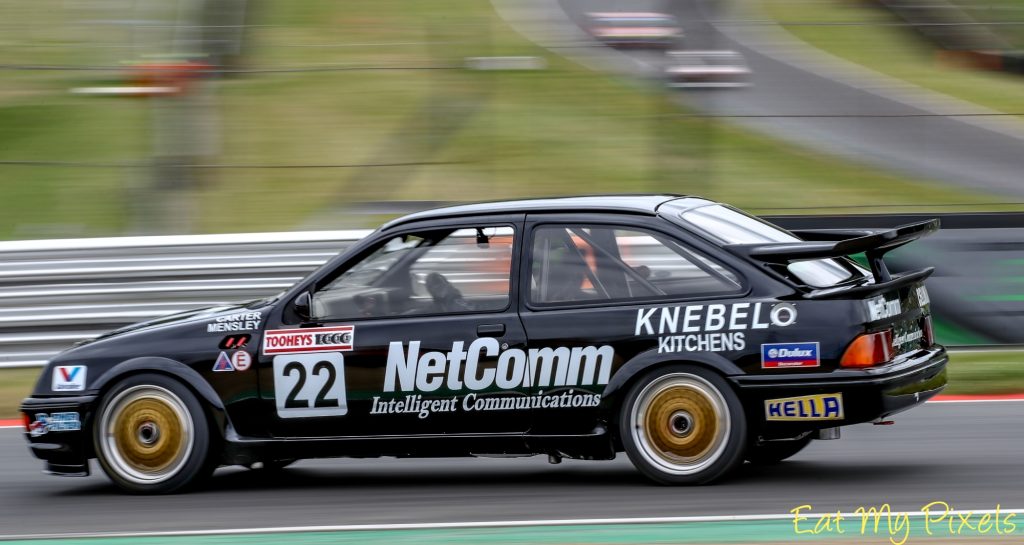
Bartrum finally scored the podium his efforts merited, having enjoyed a great weekend in which he also brought out ‘Clifford’, his stunning Listerine backed ex-Graham Goode RS500 for its first on-track appearance for over 30 years in the high-speed demos. Manning was fourth, with Halse the only other Group A finisher.
Among the classes, Mike Seabourne took a hat-trick of Pre-’93 Class A wins in his Jaguar XJS, while Byron Aldous claimed a Class D clean sweep with his sublime Volkswagen Corrado. In Class C, Dave Clark won twice on Saturday in his regular Renault 5 GT (before switching to the Group A car on Sunday), and Jamie Sturges (BMW M535 E28) and Kyffin split the honours on Sunday.
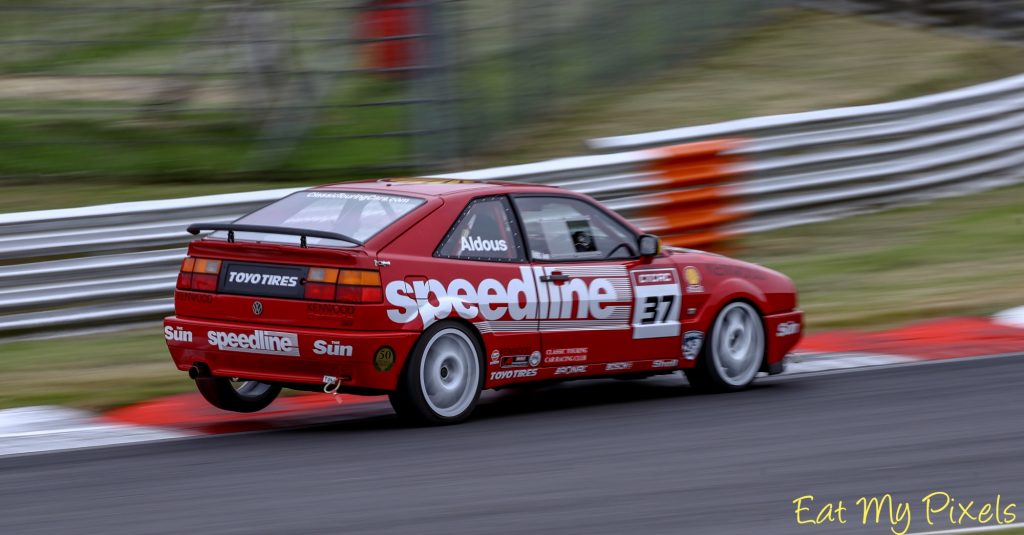
Everard Pre-’66 Touring Cars
A fantastic entry of 33 Pre-’66 Touring Cars provided some of the best racing of the weekend. Sharing a grid with Pre-’83 on Saturday, Joe Ferguson and Aaron Smith split the spoils, while local driver Bill Sollis completed a Mini clean sweep with a pair of victories on the Indy circuit on Sunday.
Four-time Mini Miglia Smith champion set the pace in Saturday qualifying, driving KAD’s historic Mini for the day. He went a tenth faster than Ferguson managed, with the pair bettered by only six Pre-’83 cars. Tim Abbott was first of the Lotus Cortinas, third in Pre-’66, ahead of Sollis and championship leader Ian Thompson (Cortina). The top six was completed by Grant Williams, bringing his Jaguar Mk1 back to the championship for the first time since the corresponding event last year, when he was a double winner.
Come race time, Ferguson used the outside line to perfection, charging around those stacked up on the inside of Paddock Hill Bend to run fifth overall in the race and briefly challenge for fourth. “I thought: ‘I’ve got to send it around the outside of the Pre-’83s,’ and that’s what I did,” he said afterwards.
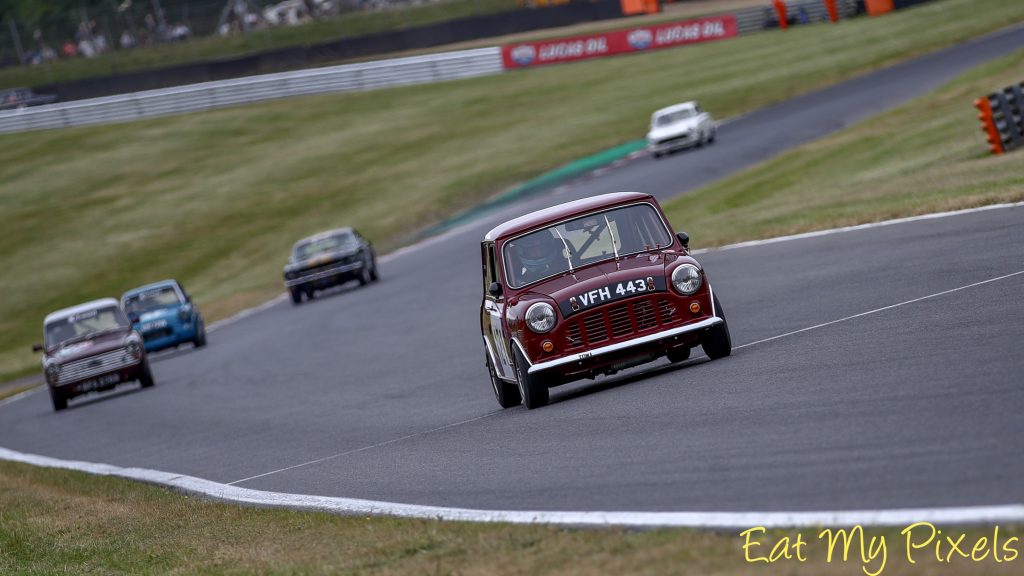
It gave Ferguson a crucial advantage over Aaron Smith that he held until the finish as they battled among the lower end of the Pre-’83 top six. Sollis was just behind them to complete a Mini 1-2-3 in Pre-’66, while Abbott won Class F as the fourth Pre-’66 car home.
The race was cut short after Michael Loveland ran wide at Clark Curve, his wheels digging into the gravel and tipping the Hillman Imp onto its side. Thankfully, Loveland – who had been keeping Class E leader James Ibbotson in sight – was fine and the Imp largely undamaged.
Saturday afternoon’s race went the distance but played out similarly – except that Tom Bell, in for Ferguson, had to start from the back of the grid. So this time it was Smith who managed to get a small buffer over Sollis, which he held to the flag, as he enjoyed battling with the Pre-’83 runners.
“It’s so good racing with the other cars,” enthused the one-make Miglia expert. “They have the edge on the straights but we are absolutely mustard through the corners. I managed to get a car between me and Bill at the start.”
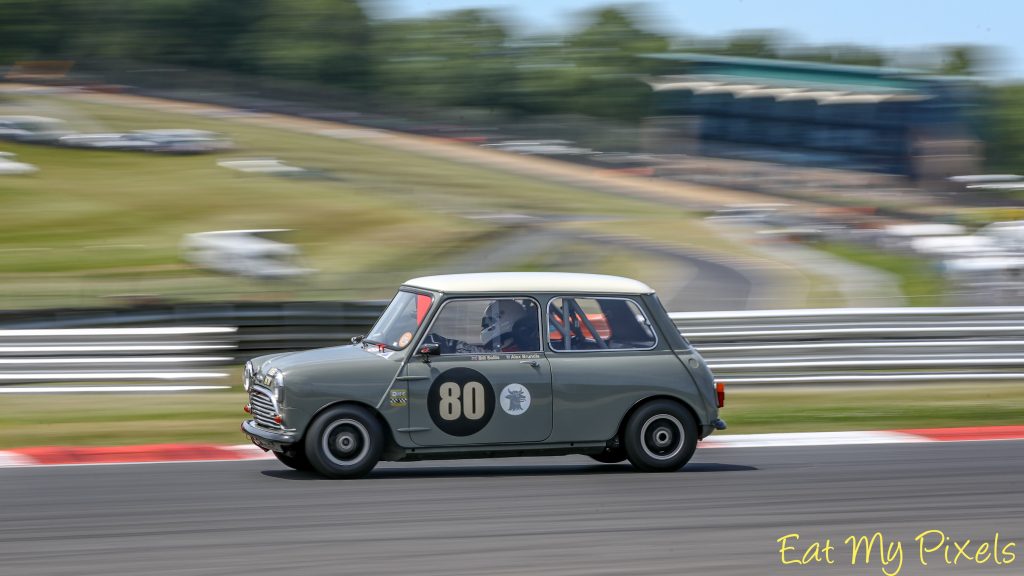
Abbott again won Class F, this time third in Pre-’66, while Bell incredibly climbed to fourth. Just behind was Williams’s venerable Jag, which turned the tables on Piers Grange and his Ford Mustang, having lost out in Class A earlier on.
Luc Wilson (Austin A40) completed a Class D double, while Nathan Berrisford (BMW 1800Ti) did likewise in Class B as the only runner.
Sunday’s action moved to the Indy circuit, which the Pre-’66 cars now had to themselves. Perhaps surprisingly, the Cortinas regained the upper hand in qualifying, with Abbott pipping Thompson to pole position ahead of Sollis and Bell. Garry Townsend’s Cortina managed to improve to fifth fastest at the death, just ahead of reigning champion Billy Kenneally, bouncing back after his Ford Anglia was hit by differential and alternator failures the day before.
Rain before Sunday’s first race helped make it a contender for race of the weekend. Conditions initially played into the hands of the Minis. Sollis got inside Thompson at the start, then went the long way around Druids to pass Abbott for the lead, with Bell following into second at Graham Hill Bend.
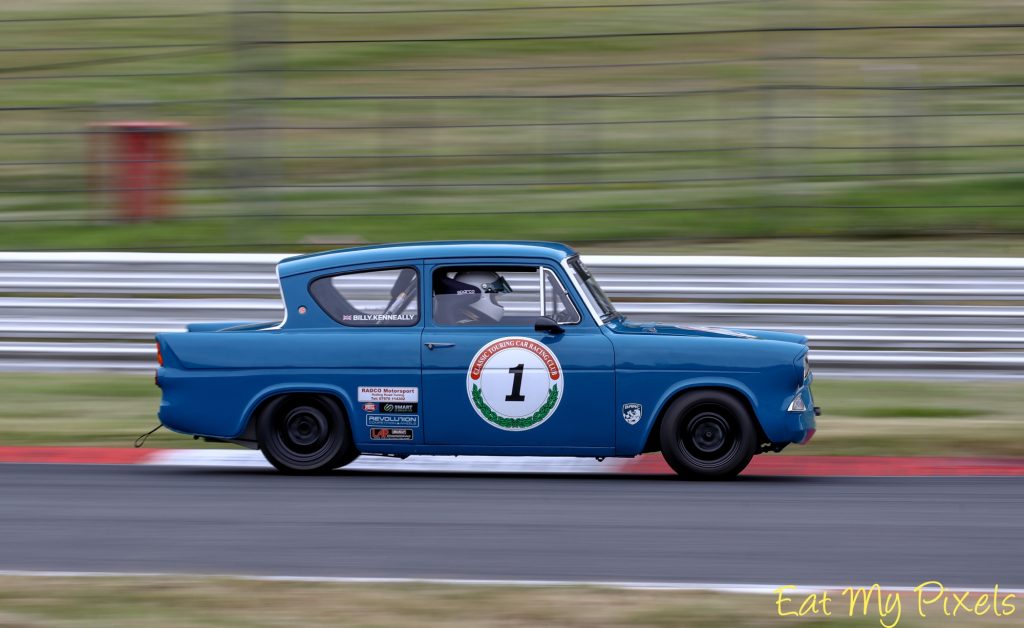
Barry Sime was also flying in his long-serving example. From eighth on the grid, he reached fourth on lap one before Grange powered past, then dived back of Grange and Abbott – who would slip back further – to take third.
Sollis was facing stern pressure from Bell, increasingly so as the rain eased and a drier line began to appear. Bell took the lead around half-distance before Sollis responded. Thompson and Abbott were also finding renewed pace and were lapping faster than the leaders as they and Williams got back in front of Sime. The Scotsman’s race then unravelled as he tangled with a backmarker at Clearways, sustaining heavy front-left damage and leaving both in the gravel.
Grange was now the man on the move, as he powered through to third before Abbott spun out exiting Graham Hill Bend. Grange charged past Bell for second at the end of lap 11 of 15, affording Sollis a slight gap out front, only to run through the Paddock Hill gravel and drop back down to fourth.
Next it was Thompson’s turn to challenge the leading Minis. He snatched second from Bell on the penultimate tour, then set the fastest lap of the race as he fell 0.5s short of victor Sollis.
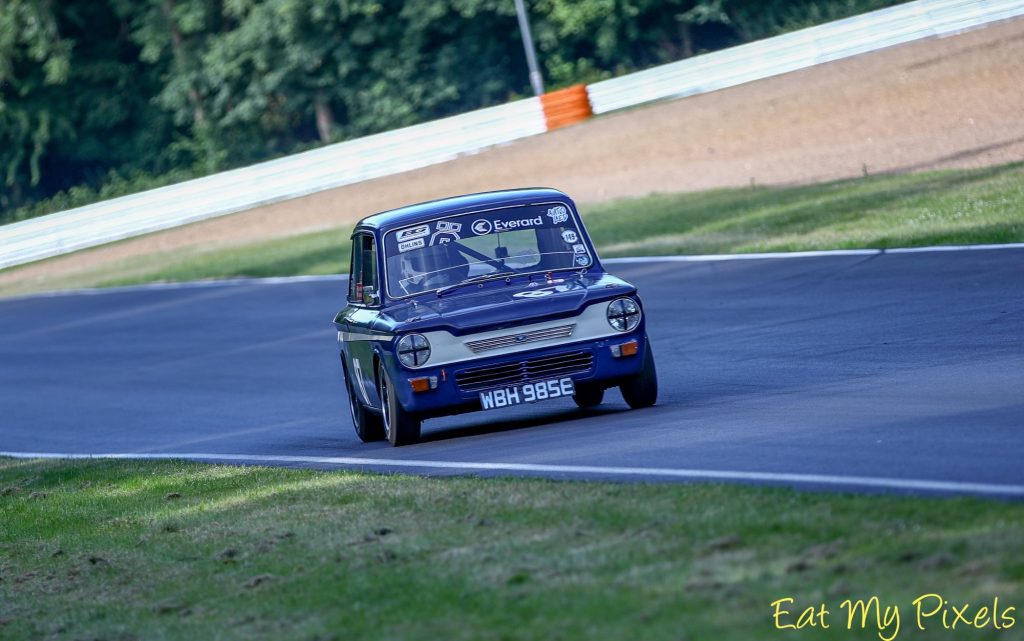
Sollis was grateful that, unusually for him, he had been convinced to tweak the set-up pre-race – and that Thompson hadn’t managed to take second a lap sooner! Thompson spoke for all of the top three when he said: “A lot of fun – clean fun. The most fun I’ve had in a racing car for years!”
Behind Bell, Grange won Class A in fourth, with Kenneally beating Williams to fifth. Ibbotson took his third Class E win of the weekend, this time beating Adrian Oliver who had been plagued with a misfire the day before, and Wilson continued his Class D winning streak.
The fourth and final race could not live up to that, but it was still an entertaining contest. With chief rivals Thompson a non-starter and Ferguson having to start from the back having taken over from Bell, Sollis looked well set – and so it proved.
Kenneally made the best start of the leading group but found himself a little boxed in and had to settle for second behind Sollis, with Grange losing third to Williams when he ran wide at Clark Curve. At the end of the first lap, Tim Sims’s Mini was fourth, Townsend fifth and, incredibly, Ferguson had risen to sixth after again profiting from the outside line at Paddock.
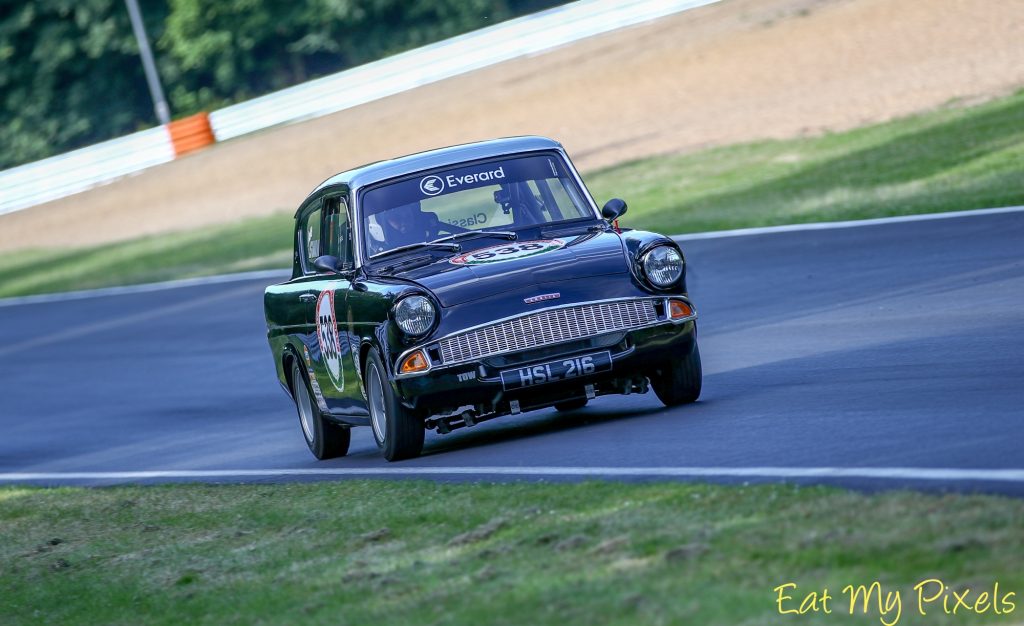
Thereafter, except for Ferguson’s continued progress, the race settled down. Ferguson was second by lap four but had worked his tyres too hard to make any further impression on Sollis, who eventually raced to victory by more than 8s.
Kenneally was third, ahead of Class A winner Williams and Sims, who had enjoyed a fine battle, with Towsend also involved. But the Cortina man picked up 15s of track-limits penalties, dropping him all the way back to 13th. Grange was also penalised, which put Jake Swann’s Anglia into sixth overall after being involved in plenty of close battles all day.
Having done well to get his Mini repaired in time to take the start, Sime climbed from the back of the grid to take seventh overall.
In Class E, Oliver took the early advantage but Ibbotson fought back and got ahead at Druids just before half-distance. But a fluffed gear-change that stalled the engine cost Ibbotson 15s and left him fourth in class, with Oliver winning from Loveland and Brendan Rooney. Wilson completed a clean sweep of Class D wins for the weekend.
Pre-’83 Group 1 Touring Cars
Reprising his strong debut in the Lovell brothers’ Ford Capri at last year’s event, Porsche Carrera Cup GB star Charles Rainford proved the man to beat in Pre-’83, winning the first three races before champion Stephen Primett took the finale.
Rainford set out his stall early on with a pole lap almost 1.5s faster than Jonathan Corker’s Datsun 510, which pushed the Ford Escorts of Mark Cholerton (Mk2) and Primett (Mk1) onto row two of the grid. Harry Hickton, back in dad Dave’s Opel Kadett, was fifth fastest, ahead of Bob Bullen.
Rainford eased to a 2s lead and never really looked liked being beaten before the opening race was truncated for Pre-’66 driver Michael Loveland’s incident. Behind him, Corker held second to win Class C, while it took Primett a couple of laps to find a way past Cholerton, with an audacious outside move at Druids.
Hickton dropped behind Bullen early on but held sixth until a moment at Westfield dropped the Mini Challenge Trophy pacesetter down the order. So Tom Harvey’s Mk1 Escort took sixth in Pre-’83 after coming out on top of a scrap with Aaron Smith’s Pre-’66 Mini.
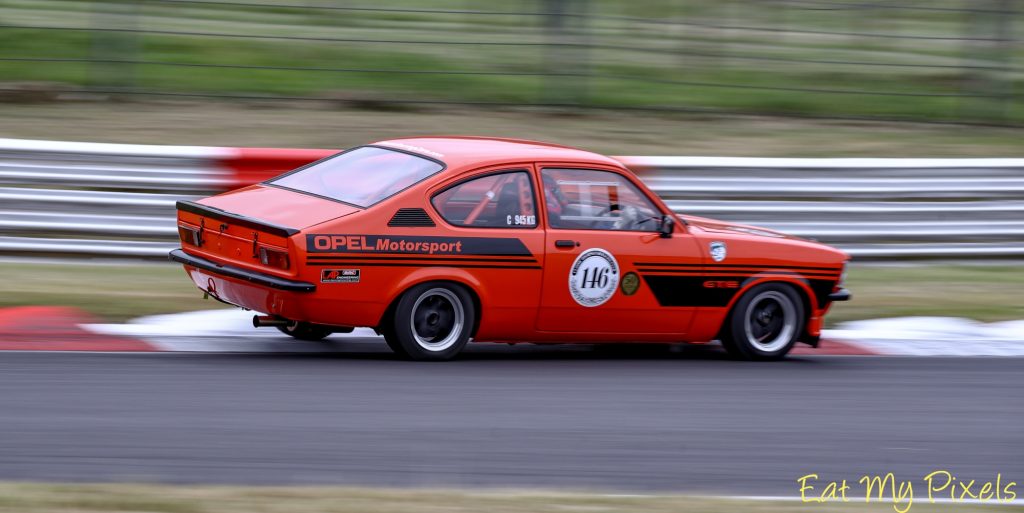
As Rainford was racing as a guest, Nick Williamson took maximum points in Class B, his Rover SD1 finishing seventh in Pre-’83, just ahead of Chris Snowdon, who was making a welcome guest appearance in his 1979 BTCC Alfa Romeo Alfetta GT.
Having made some tweaks to the Capri and his own driving style – “still trying to drive it too much like a Cup car” – between races, Rainford was even less troubled in the sequel, eventually winning by more than 6s.
Behind him, Corker was in the unenviable position of having Primett’s ivory Escort monstering his mirrors. But the Yorkshireman held firm until the final lap when the little Datsun’s engine cried enough, a broken throttle spring the frustrating – if inexpensive – cause.
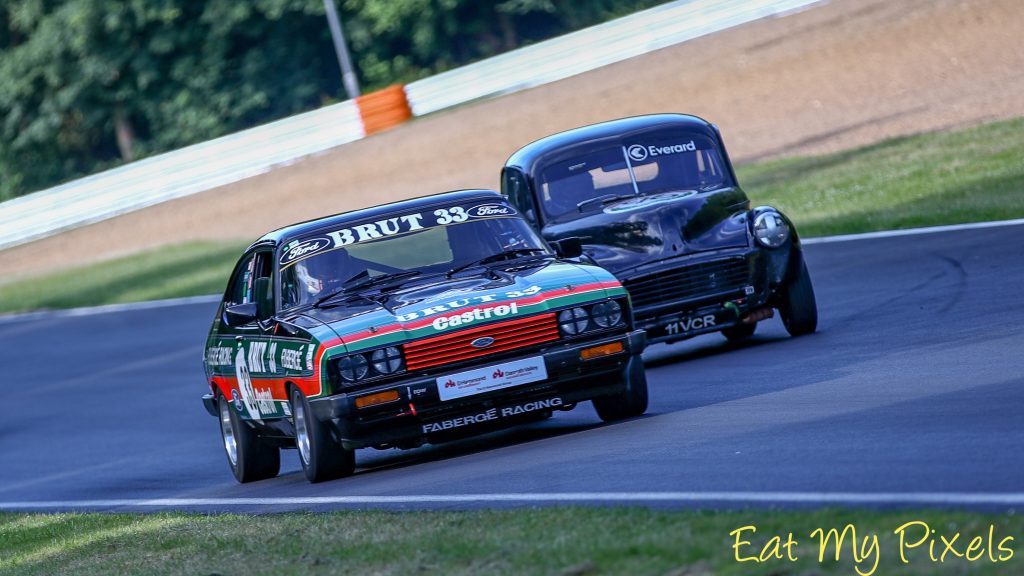
So Primett took second, well clear of Cholerton, while Hickton caught and passed Harvey’s Mk1 for fourth. The local man was nevertheless delighted to score two strong results in a car he felt was running better than ever after myriad previous issues.
Snowden again come on strong in the second half of the race to finish sixth, while a misfire on the Rover dropped Williamson back but he was still the first Class B points scorer home.
Sunday’s action on the Indy circuit welcomed some additional runners for the solo Pre-’83 races after the entry had been restricted when combined with Pre-’66. Among them was Mostyn Rutter’s Vauxhall Firenza, making its first appearance of the season after picking up damage at Donington last year.
Sadly, Malcolm Jeffs’s Golf was an early casualty the day before though, and Cholerton joined him on the sidelines after his RS2000 blew an exhaust valve in qualifying having posted the sixth fastest time.
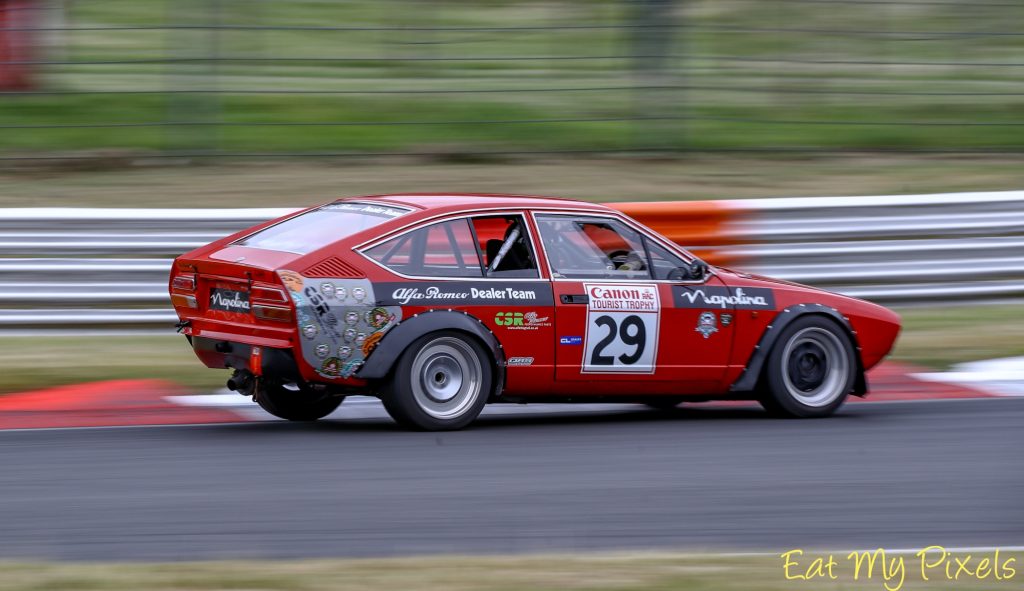
Rainford again set the pace, and Primett would join him on the front row, ahead of Corker, Hickton and Snowdon.
The Class C cars again had no answer to Rainford’s V6 power in the race, as the CCK Motorsport man screamed to his third victory of the weekend, by 4.3s. A flying start from Hickton propelled him into second, but both Primett and Corker charged past as they crossed the line to start lap two of 16.
Harvey further demoted Hickton at Druids a few tours later but he then cut the Escort’s engine and coasted to retire when he smelt fuel – luckily, it was only a loose banjo clip. The order among the remaining runners in the top four was then unchanged to the flag.
Behind them, Snowdon retired early on when his gearstick broke – thankfully not a result of the propshaft failing, as he feared. With Bullen – who lost his rear windscreen the day before – also hitting trouble, that promoted a lively squable between Mark Fowler (Escort) and Class B trio Williamson, Stuart Caie (Capri Mk3) and Dave Thomas (Capri Mk1) to be the battle for fifth.
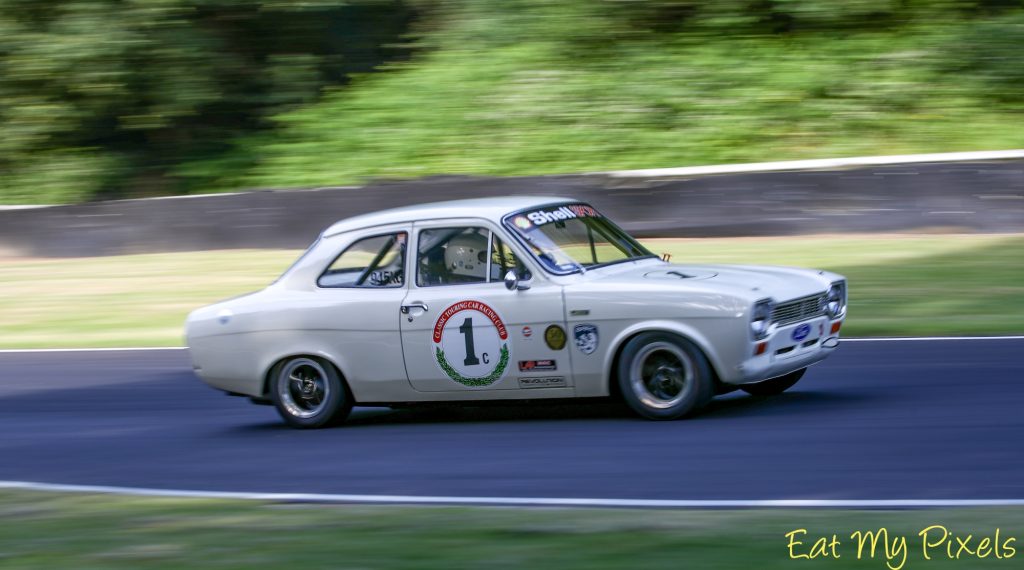
After multiple position changes, there was unfortunate contact at Clearways between Caie and Williamson which put the Capri out. That let Fowler get in front to claim fifth, with Williamson the points-scoring Class B winner in sixth, ahead of Thomas, Rutter and Bullen. Phil Waller completed the finishers to win Class D on his return in his Chrysler Sunbeam.
Rainford looked set to complete the weekend unbeaten in race four until his steering failed, firing the Faberge Capri off at McLaren. That handed Primett the lead, and he again held off the determined challenges of Corker to continue his record of scoring at least one overall win each weekend this year.
Corker had had to fight back past a fast-starting Hickton early on, but the Opel then came in to retire with a misfire. So it was Harvey who completed the podium, his first in dry conditions in the Escort, after passing both Fowler and Williamson.
From the back of the grid, Snowdon’s Alfa was closing in as the laps wound down, but he had to settle for fourth ahead of Bullen and Fowler. Thomas won Class B ahead of Williamson as the busy weekend took its toll and only eight cars made it to the chequered flag.
Edmundson Electrical Classic Thunder & Poultec Classic Race Engines Historic Thunder
An incredible entry of 41 Classic and Historic Thunder cars made for a spectacular sight, although a few were lost before the first race, including Jimmy Broadbent’s bonkers Mazda MX-5, which hit trouble again. Overall honours were split between veteran Kevin Clarke and relative newcomer Josh Lawton who took a win apiece on each day.
Clarke’s BMW M3 E46 set the pace in Grand Prix circuit qualifying, the West Midlander just edging Alex Sidwell’s mighty Holden Commodore VF, a winner at the event last year. Nick Vaughan’s Audi A3 Turbo was another three tenths back, some 1.6s clear of Andy Wilson (Holden Monaro) in fourth.
Fastest of the Historic Thunder entry was Sam Wilson, last year’s top dog, who was joining the field in Rikki Cann’s Aston Martin V8 Vantage for the first time this season. Donington winner Bryan Bransom (M3) was next, ahead of the similar car of Graham Crowhurst, and Simon Light, whose Ford Capri V8 was second in Historic Thunder.
Andy Wilson’s ex-British GT Monaro made the best start to go three-wide into Paddock Hill Bend and emerge in front, before Clarke hit back two corners later. There was trouble on the exit of Druids though, with Ronan Bradley’s M3 E36 in the wall, which led to red flags.
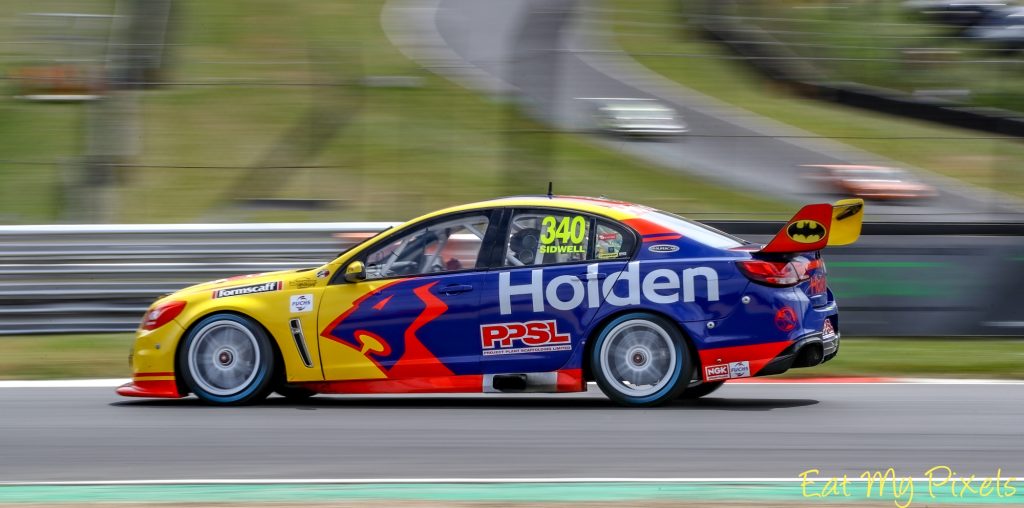
Amid a tight timetable, the race was restarted over just seven minutes, equating to five laps. Andy Wilson briefly surged ahead again, but Clarke got back in front at Druids, as Sidwell dropped back avoiding trouble in the opening corners.
Sam Wilson and Light both made good starts to run third and fourth, before Wilson passed his namesake – who was gamely hanging on to the mighty Monaro despite a loss of power-steering – and Light fell back behind a resurgent Sidwell and Vaughan.
Sidwell managed to charge past the Aston to take second on the Brabham Straight at the end of lap three but, in his haste to make up for lost time, then went off at Surtees.
Clarke cruised to a 4s victory over Vaughan, who managed to overhaul Sam Wilson mid-race, but the Aston still won Historic Thunder in third overall. Andy Wilson manhandled his Holden to fourth, ahead of Light and Adrian Bradley’s M3 E46. An impressive seventh, having briefly climbed to fifth before being slowed by rising temperatures, was Josh Lawton’s supercharged Honda Civic – all the way up from 32nd on the grid after having his only quick lap in qualifying deleted.
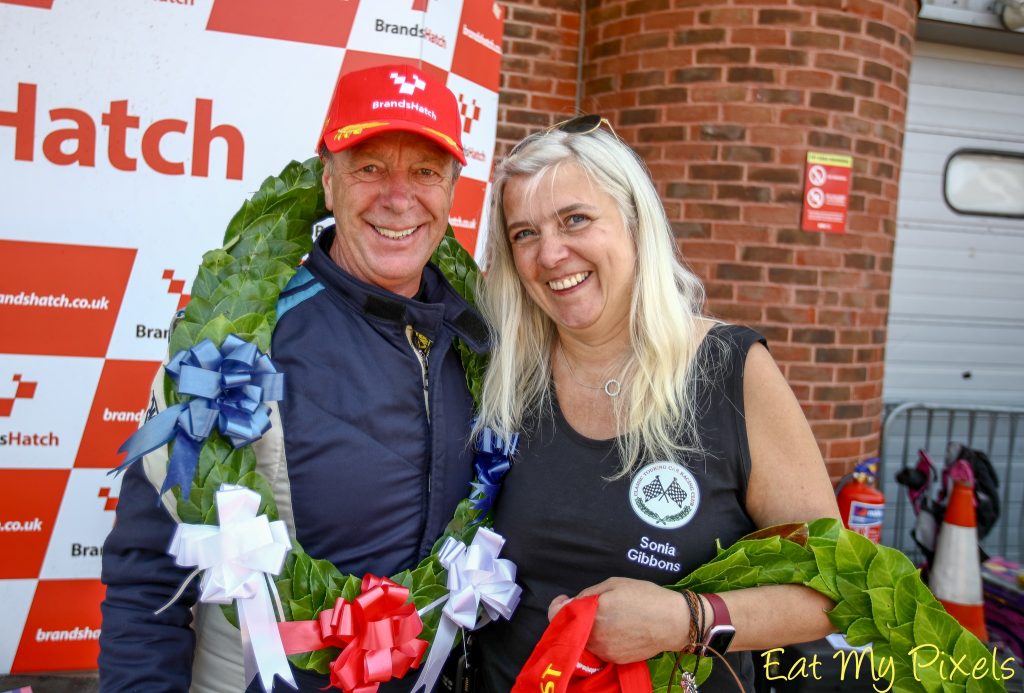
With Wilson parking up the Monaro for the rest of the weekend, Lawton effectively started sixth in the sequel. Running slicks for the first time this season, and with his boost slightly turned up, the Civic was sensationally fast and picked its way through to run second, right on Clarke’s tail, within three laps. He simply powered past on the Cooper Straight, and pulled 4.5s clear before throttling back to win by 2.5s.
Clarke was still a strong second, holding off running mate Bransom. They were more than 10s up the road from fourth-placed Vaughan, who in turn was 18s clear of three-time champion Andy Robinson, whose Ford Falcon’s battery was causing it to cut out, and Crowhurst. Kirk Armitage’s E36 had been in the fight until its last-lap retirement, leaving Adrian Bradley seventh, just ahead of Sidwell. The latter had charged from the back of the grid after missing his slot in the busy assembly area.
In Historic Thunder, Wilson’s Aston retired with what was eventually diagnosed to be an oil-pump problem, and Light had a very scary moment when his front-left suspension collapsed at the circuit’s fastest section, approaching Hawthorn Bend. He managed to keep the Capri out of the wall but his weekend was done. With Abbie Eaton also experiencing a catalogue of problems aboard her father’s VH Commodore, Colin Voyce won the category in his Mountune-powered Ford Escort Mk1.
Sunday’s action on the Indy circuit was better suited to the nimbler cars. Lawton, the only man to go sub-50s all day, charged to pole position by nearly a second from Vaughan. Jasver Sapra (E46) was just 0.007s faster than Sidwell in third, ahead of Clarke and Crowhurst. After an ECU problem forced him to miss Saturday’s first race, BOSS man Malcolm Harding was back in the fray; his Mk2 Escort went seventh fastest, best of the Historic runners.
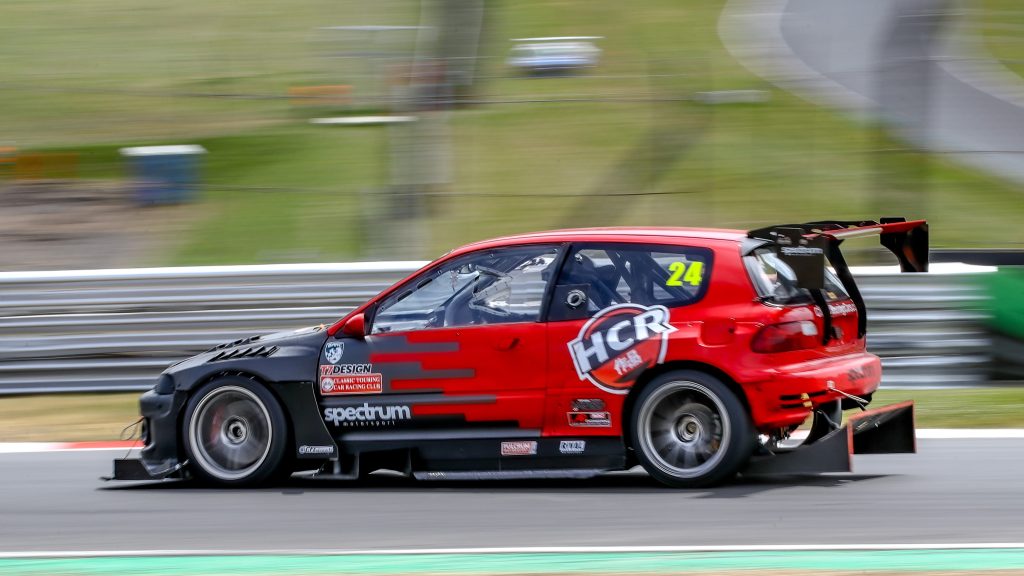
Nobody really had an answer to Lawton’s incredible pace in the opening stages of the race as he built a 4.5s margin after just three laps. Second-placed Vaughan was facing pressure from Clarke until the latter slowed briefly when his driver’s door came open. That released Sidwell, who was recovering from another cautious start.
With Sidwell pushing Vaughan on, and Lawton turning the wick down and being cautious through traffic, it briefly looked like he might be threatened by the chasing pair. But as they charged up Hailwood Hill towards Druids, with around three minutes remaining, Vaughan tried to get inside a backmarker but had to take to the grass. Unable to slow the Audi, he ploughed straight on into the gravel. Unable to turn in, Sidwell’s Holden ended up joining him there.
The race was called early, with Clarke inheriting second from Adrian Bradley, Historic winner Harding, Sapra and Mike Cutt (E36).
“As soon as the sun comes out, the car doesn’t like it,” reported Lawton, who found himself constantly battling high temperatures. “I’ve just got to make a break at the start and then manage the car.”
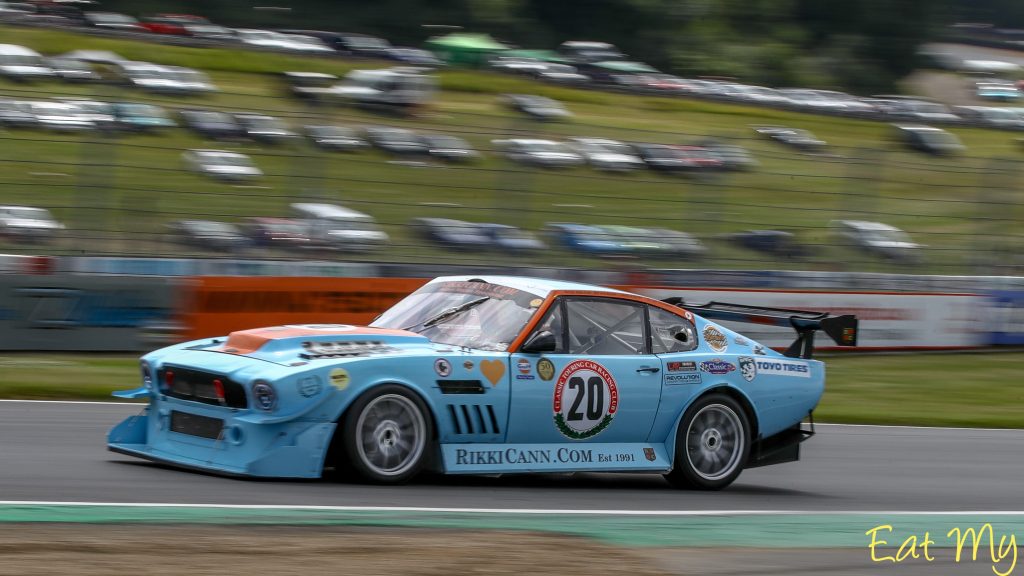
That was something the Humberside man was unable to do in race four. Clarke rounded the Civic at Druids on the opening tour, then Lawton somehow held onto an almighty moment on cold tyres at Graham Hill Bend, dropping several places in the process.
As Clarke charged to an untroubled victory, despite struggling with understeer, Cutt picked off Crowhurst, Sapra and Harding to claim second. It was a fine end to the weekend that had begun with damage from contact forcing him out of the first race.
Lawton’s recovery to third was again hampered by sky-high temperatures, possibly inflicting terminal damage on the K24 engine. But he brought it home for another podium, ahead of Sapra, Historic winner Harding and Adrian Bradley. Back in 12th, Sidwell still won Class A. Among the less powerful cars, Oliver Owen (E36 M3) took a clean sweep of four Class C wins over the weekend.
Burton Power Blue Oval Saloon Series
With the RS500s running in Group A for the weekend, BOSS was largely the domain of Escorts and Fiestas. Malcolm Harding ruled the roost in his Smith & Jones-powered Mk2 Escort, the Zakspeed tribute car winning all four races.
Harding set the pace in Grand Prix circuit qualifying, going 1.5s quicker than points leader Piers Grange’s similar car, the pair both quicker than all the Group A cars with which they were running on Saturday.
Unfortunately, Grange took a trip through the Paddock Hill Ben gravel trap that damaged the front end of his car, leaving it sidelined for the day. Martin Reynolds’s Escort was next best in BOSS, albeit behind the leading Pre-’93/Pre-’03 cars with which they would share the second portion of the grid. Mallory Park winner Olly Allen (Fiesta Mk6) was fourth quickest in BOSS, with Craig Owen’s Sierra Cosworth some way further back and Tim Mizen’s Fiesta quickest of those on treaded rubber.
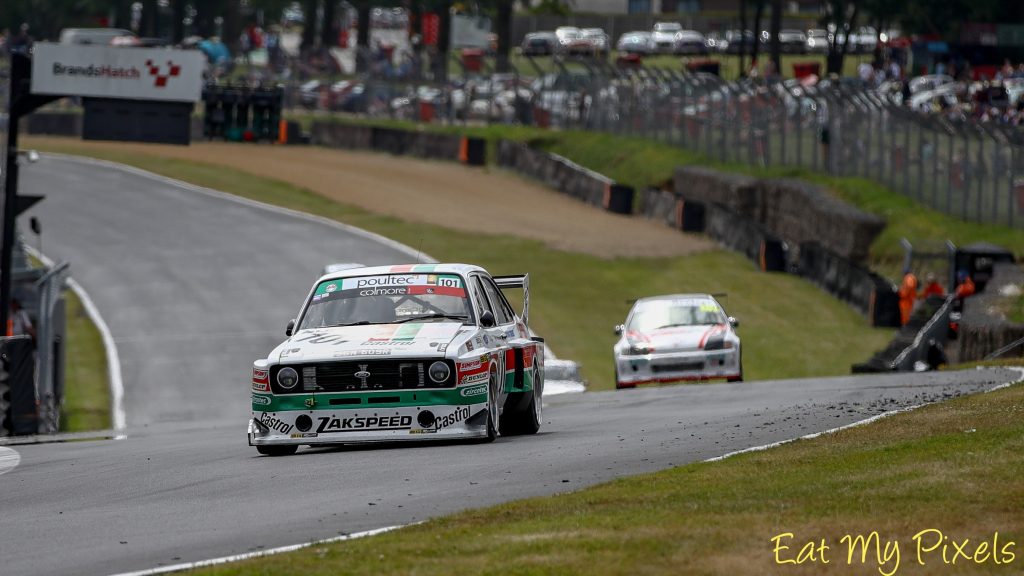
Harding was untouchable in the race, powering through to challenge the Group A leaders en route to victory. Allen and Reynolds battled the Pre-’93/Pre-’03 leaders, and finished in that order, well clear of Owen who had Mizen on his tail.
Race two brought a repeat podium, Harding 20s down the road from Allen, who was sandwiched between the Pre-’03 top two, a similar distance ahead of Reynolds. Mizen edged Will Hunt’s newer Fiesta to Class D honours in a closely fought contest.
Moving to the Indy circuit, and sharing with only the Pre-’03 cars, Harding was still 0.7s clear of Allen in qualifying. Grange was another second down, 0.8s clear of Reynolds. Mizen was an impressive fifth in BOSS, ahead of Owen. Seventh fastest was Sam Daffin’s rear-wheel-drive Fiesta, which had run in Thunder the day before, now on treaded rubber as he focuses on sorting the car.
Sunday’s first race was red-flagged after a heavy accident for Pre-’03 driver Adam Shepherd. Re-run over the full distance, Harding controlled from the front as Allen had his hands full with Pre-’03 man Gary Prebble.
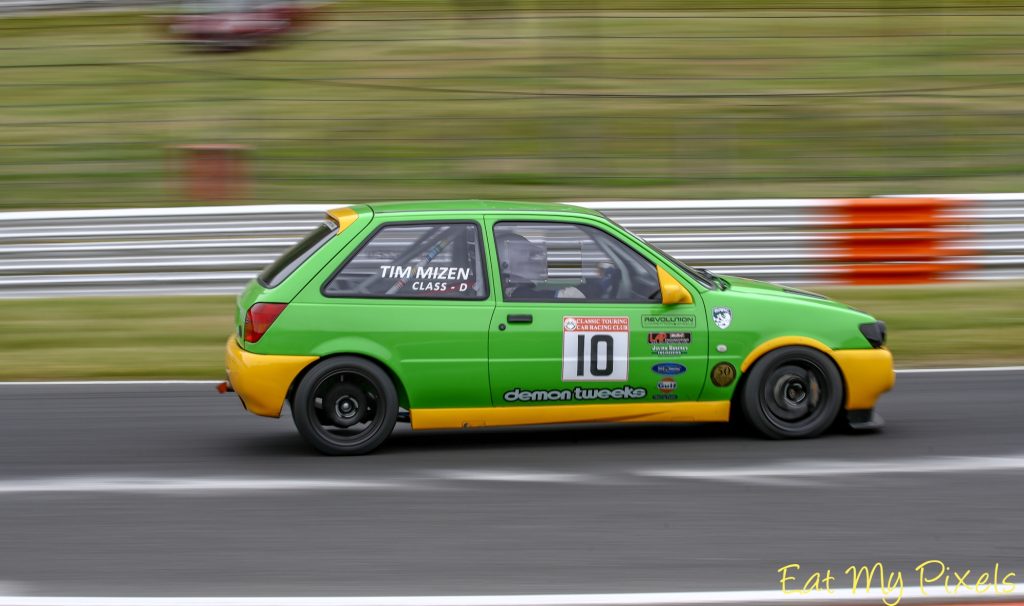
Allen took a few laps to get back in front of Prebble but then closed the gap to Harding, who kept him at arm’s length while trying not to ask too much of his hard-worked Escort after an incredibly busy weekend.
So Harding’s 0.47s win was probably more comfortable than it looked. The pair were nearly 30s up the road from Reynolds who took advantage of Grange’s gear-selection difficulties to pip him to the BOSS podium. Daffin was best of those on treaded rubber and won Class C, while Mizen again took the honours in Class D.
With Grange a non-starter for race four, the top three were well spread en route to a another repeat podium. Daffin was denied a second class win by a last-lap retirement, while Mizen celebrated a Class D clean sweep after overhauling Hunt on the final lap.
Burty Haulage Pre-’03 Touring Cars
Pre-’03 dominator Gary Prebble faced tough competition from category newcomer Adam Shepherd in Jonathan Bevan’s Honda Integra DC5. But while the TCR UK ace set the pace and took a win on the Grand Prix circuit, Prebble was otherwise untroubled en route to three wins across the weekend.
Shepherd’s Integra was more than half a second clear of Prebble’s Honda Civic EG in GP circuit qualifying. One-time champion Cavan Grainger was nearly 3s further back in his Class A BMW 330ci E46, well clear of his closest challenger – the smart E36 Touring of John Hillyer. The EP3 Civics of Neil Ashcroft and Dave Hutchins completed the top six, ahead of the little Class D Peugeot 106 of Andrew Neal.
Shepherd looked well on the way to an impressive victory in the race when his car reverted to limp mode. An over-cautious sensor had taken a disliking to rising temperatures, costing him more than a minute and dropping the Integra to almost the back of the field.
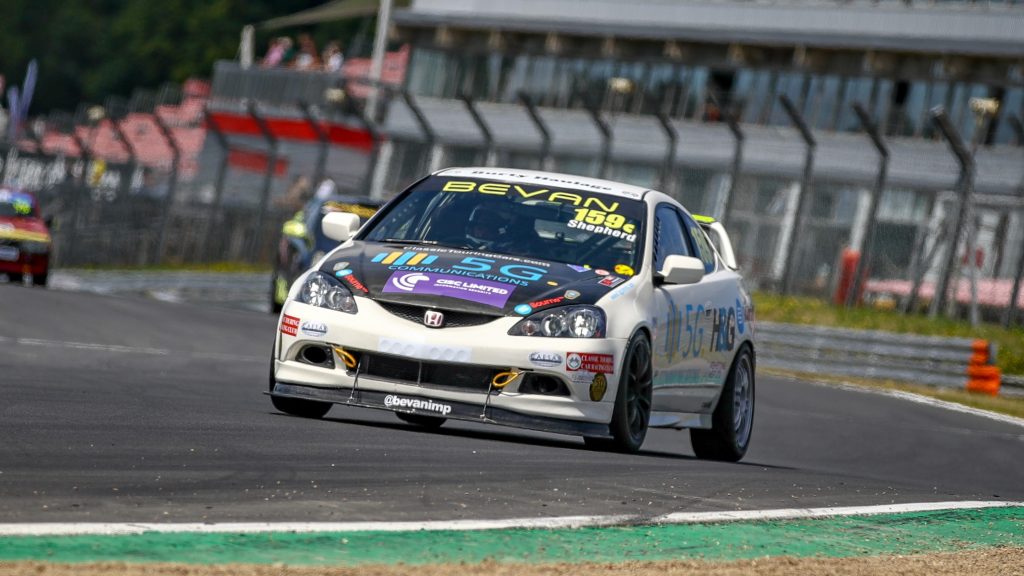
So Prebble enjoyed a scrap with some of the leading BOSS and Pre-’93 cars en route to a dominant win, more than 30s clear of team-mate Dorrington who would have been delighted with second overall in Pre-’03. Hutchins completed the podium, while Grainger’s trip through the gravel and subsequent retirement left the way clear for Hillyer to win Class A.
With the offending sensor dumped, Shepherd set about an impressive charge through the field in the sequel. From slot 43 on the combined grid – effectively 36th due to the gap left after the Group A cars – he charged through to an incredible sixth overall and Pre-’03 victory.
He passed Prebble in traffic in the closing stages and put a BOSS car between them as he came home 2s to the good. Prebble had to settle for second, still a long way clear of Dorrington in third, as Hillyer again topped Class A.
On Sunday morning, Prebble hit back with Indy circuit pole position, 0.154s faster than the Integra, with Dorrington third. Adam Read joined the fray in his BMW Compact, and was only marginally slower than Dorrington, with Neal next, and Hillyer quickest of the three remaining Class A runners.
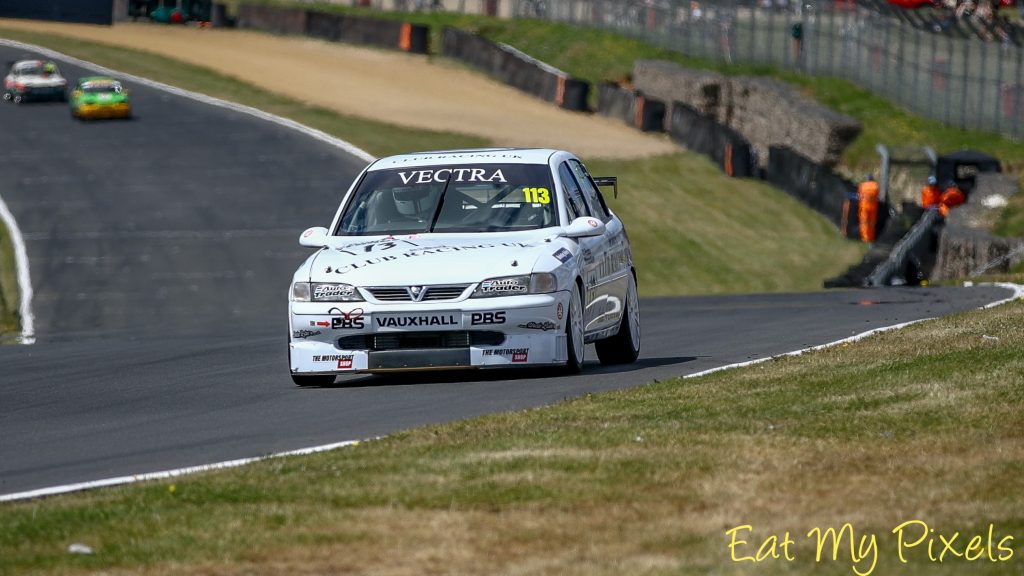
Sadly, round three of the Prebble/Shepherd duel didn’t get very far. Shepherd appeared to make the better start, but Prebble held the inside line as Shepherd was baulked by a BOSS car on cold slicks. Coming into Graham Hill Bend, Shepherd went around the outside of BOSS man Olly Allen, but got tipped across the front of the Fiesta on the exit.
The Integra went hard into the barriers, copping a lot of damage and ending Shepherd’s day. Dorrington had also spun at the same corner but was handed a reprieve by the red flags and complete restart.
That proved easy pickings for Prebble who, after the early exchanges, drove a lonely race to third on the road behind two BOSS cars, more than half a minute up on runner-up Dorrington. Read completed the podium, while Anton Martin (BMW 330ci) got the better of Hillyer in Class A.
It was a similar story in the final race of a very busy weekend. Prebble won by 30s from Dorrington, although Hutchins beat Read to third. Martin fended off Hillyer to win Class A by less than half a second.
Full results are available via the TSL website.
All images courtesy of CTCRC official photographer Steve Jackman/Eat My Pixels
